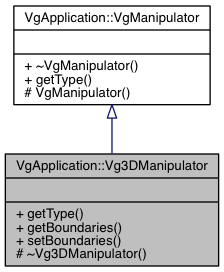Allows to customize the Vg3DManipulator.
More...
Allows to customize the Vg3DManipulator.
For example, if you wanted to change the minimum altitude to 100
std::string lCurrentManipulator = lApplication->editManipulatorManager()->getCurrentManipulator();
if (lManipulator != NULL || lCurrentManipulator == "3D")
{
}
- Version
- 2.1.0
| virtual VgApplication::Vg3DManipulator::~Vg3DManipulator |
( |
| ) |
|
|
inlineprotectedvirtual |
Retrieves the current boundaries of the camera.
- Parameters
-
| pMinimumPosition | Updates with the minimum latitude, longitude, and altitude the camera is allowed to move. |
| pMaximumPosition | Updates with the maximum latitude, longitude, and altitude the camera is allowed to move |
- Returns
- true.
| virtual std::string VgApplication::Vg3DManipulator::getType |
( |
| ) |
const |
|
pure virtual |
Set the boundaries where the camera can move.
If the current camera position is outside this new boundary, the camera will be moved inside this new area.
The original values for the manipulators are set on the vg_config.xml or via the default values of the dataset It is usually smaller than that found on the dataset.
- Parameters
-
| pMinimumPosition | Minimum latitude, longitude, and altitude the camera is allowed to move. |
| pMaximumPosition | Maximum latitude, longitude, and altitude the camera is allowed to move. It supposes the all the values are greater than the values in pMinimumPosition |
- Returns
- true.
- See Also
- VgEngine::VgIDatabase::getCurrentDatasetDescriptor
The documentation for this class was generated from the following file:

 Public Member Functions inherited from VgApplication::VgManipulator
Public Member Functions inherited from VgApplication::VgManipulator Protected Member Functions inherited from VgApplication::VgManipulator
Protected Member Functions inherited from VgApplication::VgManipulator